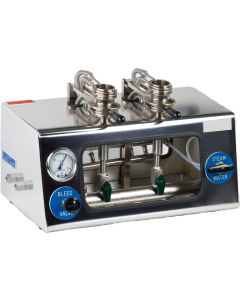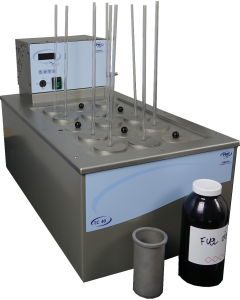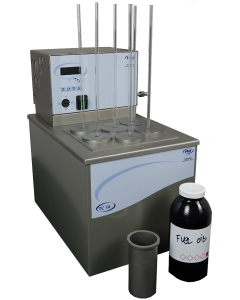Why is it important to determine the total sediment is residual fuels?
Appreciable amounts of sediment in a residual fuel oil can cause fouling of facilities for handling, and give problems in burner mechanisms. Sediment can accumulate in storage tanks, on filter screens, or on burner parts, resulting in obstruction of the flow of oil from the tank to the burner.
Summary of the test method
For ASTM D4870, ISO 10307, IP 375 and IP 390 (proc. A) tests, a weighed quantity of the (thermal) aged oil sample is filtered through the prescribed apparatus at 100°C. After solvent washing and drying the total sediment on the filter medium is weighed. The test is to be carried out in duplicate. Thermal ageing of the sample in an oil bath is a well established technique for determining whether sediment will precipitate from residual fuel oils during storage and handling.
Why should you use a Tamson bath for thermal ageing of the sample?
Tamson supplies oil baths with accessories in order to thermal age the sample as prescribed in the appendix of the ASTM D4870, ISO 10307, IP 375 and IP 390 (proc. A) methods for this total sediment test in residual fuels. The very good insulated Tamson oil baths are the most robust in the market with the widest temperature range from ambient +5°C to 250°C. A selection can be made between two oil baths to thermal age the sample. The cover (P/N 03T2310) for the TC16 oil bath offers six holes for air wells. The cover (P/N 03T2312) offers fifteen holes for air wells in a TC40 oil bath. Cover needs to be bought separately as an accessory. Air wells, conical flasks, condensers and stoppers can be bought from Tamson as well. Other accessories like the filtration apparatus, oven, and steam generator are on request.
Please contact our sales team (sales@tamson.nl) to get a quotation. Or visit our webshop to get price and technical information of a Tamson oil bath and the required accessories to thermal age the sample as prescribed in the appendix of the ASTM D4870, ISO 10307, IP 375 and IP 390 (proc. A) methods for this total sediment test in residual fuels.


